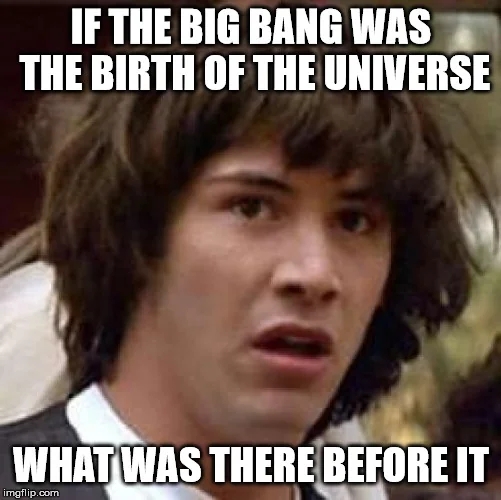Origin of the Universe…
I’m a fan of sitcoms, I admit. And one of my favorite shows is “Big Bang Theory.” You know, the one with the catchy theme song:
While the characters in the show are atheistic scientists, the show’s title holds to what most of the scientific community, atheists and God-believing scientists, hold – that the universe had a singular event that was the start of it all. While this concept appears to terrify conservative Christians, it should not be a cause of distress. In The Comprehensive Guide to Science and Faith, William Dembski notes that, since Christians understand that creation was an invention from the mind of God, it is something that can be understood (and thus tested and explained) by people who are made in God’s image.[1]
The Big Bang Theory is no different.
The idea behind it is that the universe is observably ever expanding. Since the universe is expanding, there must be a point at which it can be traced back to being incredibly small and dense, a singularity, that had to come from somewhere. The National Academy of Sciences points out, “all the currently observed matter and energy in the universe were initially condensed in a very small and infinitely hot mass.”[2] Nothing comes from nothing. Also in The Comprehensive Guide to Science and Faith, Bruce Gordon notes, “Even in infinite arena of mathematical possibilities lacks the power to generate one solitary universe.”[3]
I’m a fan of memes, because I believe they have the power to communicate large ideas succinctly. Recently I saw a meme of Keanu Reeves that talked about this topic…

That’s the beauty of the science of the Big Bang Theory! All of the matter in that singularity could not spontaneously exist by itself. Nothing comes from nothing. Something is only created when acted upon by a greater power. While people may not believe that the Big Bang Theory points to the Judeo-Christian God of the Bible, it is hard to deny that the theory DOES point to an outside source who initiated the beginning of time and the cosmos.
This should encourage Christians. Rather than undermining Scripture, accepted science supports a biblical understanding of the foundations of the universe. With a scientific foundation for understanding the birth of the cosmos, even if believers and non-believers never see eye-to-eye on the nature of the Divine, we may all at least have a starting point at which we may begin an honest dialogue.
What do you think? You may not agree with my view of God, but it had to start from somewhere… If you want to have a respectful conversation, you’re always welcome to comment. :)
[1] Dembski, William A. The Comprehensive Guide to Science and Faith: Exploring the Ultimate Questions about Life and the Cosmos. Eugene: Harvest House Publishers, 2021.


